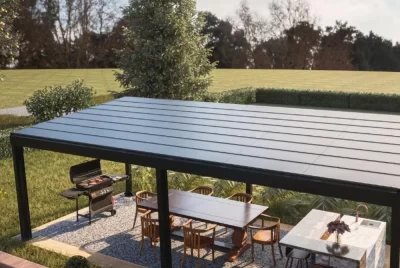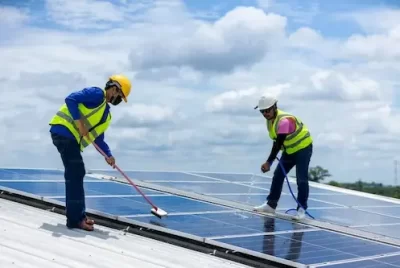Top 5 Solar Power Solutions for Homes: Choosing the Right System for You
We may earn a commission for purchases made using our links. See our disclosure to learn more.
Introduction
As the world embraces renewable energy sources, solar power has gained immense popularity. Harnessing the power of the sun to generate electricity for homes not only reduces our carbon footprint but also provides significant cost savings in the long run. In this article, I will guide you through the top 5 solar power solutions for homes, helping you make an informed decision and choose the system that best suits your needs.
Understanding Solar Power
Solar power is the conversion of sunlight into electricity using photovoltaic (PV) panels. These panels consist of solar cells that capture the sun’s energy and convert it into usable electricity. The energy generated can be used to power various appliances and devices in your home.
Benefits of Solar Power for Homes
Before we dive into the top 5 solar power solutions, let’s explore the benefits of installing a solar power system in your home:
1. Cost Savings: Solar power reduces or eliminates your reliance on traditional electricity sources, resulting in significant cost savings on your energy bills.
2. Environmental Friendliness: Solar power is a clean and renewable energy source, contributing to a greener planet and reducing greenhouse gas emissions.
3. Energy Independence: With solar power, you become less dependent on the grid, providing you with energy security and protection against rising electricity prices.
4. Long-Term Investment: Installing a solar power system is a long-term investment that adds value to your home. It can also provide a return on investment through government incentives and net metering programs.
5. Low Maintenance: Solar power systems require minimal maintenance, with most components having a lifespan of 25 years or more.
Factors to Consider Before Choosing a Solar Power System
Before selecting a solar power system for your home, consider the following factors:
1. Energy Requirements
Assess your household’s energy requirements to determine the size of the solar power system you need. Analyze your electricity bills and identify your peak usage to ensure the system can meet your needs.
2. Available Space
Evaluate the available space on your property for solar panel installation. Consider factors such as roof orientation, shading, and structural integrity. If roof space is limited, ground-mounted systems could be an alternative.
3. Budget
Determine your budget for installing a solar power system. Consider the upfront costs, potential financing options, and long-term savings. Remember to factor in maintenance costs and warranties when calculating the overall expenses.
4. Local Regulations and Permits
Research local regulations, permits, and incentives related to solar power systems in your area. Different regions may have specific guidelines and requirements for solar installations. Check if there are any permits or approvals needed before proceeding with the installation to ensure compliance with local regulations.
Top 5 Solar Power Solutions for Homes
Now let’s explore the top 5 solar power solutions for homes:
1. Solar Panels
Solar panels are the most common and widely used solar power solution. They convert sunlight into electricity and can be installed on rooftops or ground-mounted. Solar panels are available in various sizes and efficiencies, allowing you to choose the ones that align with your energy needs and available space.
2. Solar Water Heaters
Solar water heaters utilize the sun’s heat to warm up water for domestic use. They are an excellent addition to any home, as water heating can be a significant energy expense. Solar water heaters are cost-effective, environmentally friendly, and can significantly reduce your reliance on conventional water heating methods.
3. Solar Battery Systems
Solar battery systems store excess energy generated by your solar panels during the day for use during nighttime or periods of low sunlight. These systems ensure that you have a continuous power supply, even when the sun is not shining. Solar battery systems offer energy independence and can provide backup power during grid outages.
4. Solar Air Conditioning Systems
Solar air conditioning systems use solar power to cool your home, providing an energy-efficient alternative to traditional air conditioning units. These systems utilize the sun’s energy to power the cooling process, reducing electricity consumption and lowering your carbon footprint.
5. Solar-Powered Outdoor Lighting
Solar-powered outdoor lighting is a practical and sustainable solution for illuminating your outdoor spaces. These lights are equipped with solar panels that charge during the day and automatically light up at night. They are easy to install, require no wiring, and are a cost-effective way to enhance the aesthetics and security of your home.
Choosing the Right Solar Power System for You
To select the right solar power system for your home, follow these steps:
1. Assessing Energy Needs
Determine your average daily energy consumption and identify your peak usage periods. This information will help you estimate the size of the solar power system required to meet your energy needs.
2. Evaluating Available Space
Evaluate your property’s available space for solar panel installation. Consider the orientation and angle of your roof, shading from nearby objects, and any structural limitations. If roof space is limited, ground-mounted systems or solar carports can be viable alternatives.
3. Setting a Budget
Set a budget for your solar power system, taking into account the upfront costs, potential financing options, and long-term savings. Consider the return on investment and payback period when assessing the financial feasibility of the system.
4. Researching Local Regulations
Research the local regulations, permits, and incentives specific to solar installations in your area. Ensure compliance with any requirements and take advantage of available incentives to maximize the benefits of your solar power system.
5. Consulting with Professionals
Seek guidance from solar energy professionals or reputable solar installation companies. They can assess your energy needs, evaluate your property, and provide personalized recommendations based on your specific circumstances. Professional advice will help you make an informed decision and ensure a smooth and efficient installation process.
Conclusion
Investing in solar power solutions for your home offers numerous benefits, including cost savings, environmental friendliness, and energy independence. By understanding your energy requirements, evaluating available space, considering your budget, researching local regulations, and seeking professional advice, you can choose the right solar power system that aligns with your needs and preferences. Embrace the power of the sun and make a positive impact on your energy consumption and the environment.
FAQs
1. How long do solar panels last?
Solar panels typically have a lifespan of 25 to 30 years. However, their efficiency may gradually decrease over time. It’s important to choose high-quality panels from reputable manufacturers and ensure regular maintenance to maximize their longevity.
2. Do solar power systems work on cloudy days?
Yes, solar power systems can still generate electricity on cloudy days, although the output may be lower compared to sunny days. Solar panels can capture diffuse sunlight and convert it into usable energy, albeit at a reduced efficiency.
3. What is net metering?
Net metering is a billing arrangement offered by many utility companies. It allows homeowners with solar power systems to receive credits for the excess electricity they generate and feed back into the grid. These credits can offset the electricity consumed from the grid during periods when the solar system is not generating sufficient power.
4. Are there any government incentives for installing solar power systems?
Many countries and regions offer government incentives, such as tax credits, rebates, or feed-in tariffs, to encourage the adoption of solar power systems. These incentives can help reduce the upfront costs and improve the financial feasibility of installing solar power in your home. Check with local authorities or consult with solar professionals to learn about the available incentives in your area.
5. Can I install solar panels myself, or do I need professional installation?
While it’s technically possible to install solar panels yourself, it’s highly recommended to hire professionals for the installation. Solar panel installation involves electrical work, structural considerations, and compliance with local regulations. Professionals have the expertise and experience to ensure a safe and efficient installation, as well as provide warranties and support for the system.
Remember, each home’s solar power needs are unique, so it’s essential to consult with experts and thoroughly evaluate your options before making a decision. Embrace the benefits of solar power and make a sustainable choice for your home and the environment.




